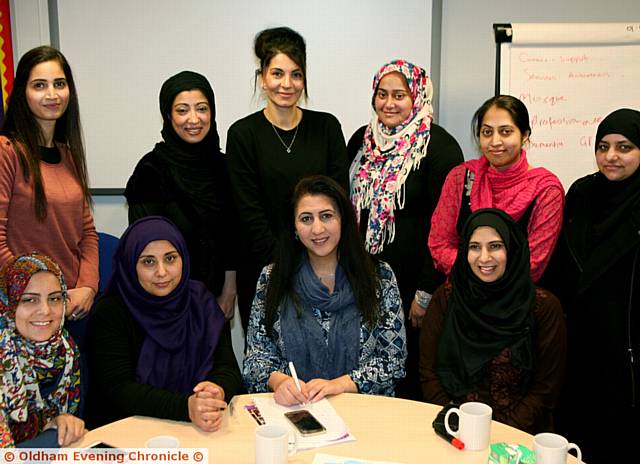Groups heading campaign for dementia openness
Reporter: Iram Ramzan
Date published: 24 November 2016

DEMENTIA awareness session with Najma Khalid, founder and CEO of the CHAI project, front row, centre, and members of the project
DEMENTIA is still a taboo in South Asian communities - but a lot of work is being done to raise more awareness of the illness.
Currently, there is no word for dementia in any of the South Asian languages, just words that describe the symptoms.
Many people believe that losing one's memory is a natural part of the ageing process, which is why it is important to know the difference between normal age-related forgetfulness and the symptoms that may indicate a developing cognitive problem.
The Oldham Dementia Action Alliance is made up of organisations across the borough, working together to radically improve the lives of people living with dementia and their carers.
Part of this alliance is Amanda Barell, from Making Space, who has helped set up a support group for Asian people living with dementia at the Coppice Community Centre in Werneth Hall Road.
REMINISCING
A lot of the work they have done at the sessions is to get people focusing on reminiscence through art work, which Amanda believes is important because it keeps them included in conversations.
The sessions are due to end next month - Amanda hopes they can continue in the new year and get more groups doing something similar.
"People were discussing their marriages and celebrations," said Amanda. "That was moving. People went back to talking about good times.
"Some people who were married back in their own countries were telling us about their celebrations and what they wore.
"They worked with spices. Anything sensory triggers memories.
"It takes them back to cooking with their mums or cooking for their families.
"We threw in a lemon and it led onto the discussion about somebody that was in Bangladesh farming with lemons.
"Their short term memory is what goes first. People have forgotten what they had for breakfast or their appointments but they can remember what happened in Pakistan or Bangladesh like it was yesterday.
MEMORIES
"It's really important that we draw out these memories. It keeps them included in the conversation."
Amanda was particularly inspired by the House of Memories training programme, in the National Museums Liverpool, which supports the carers of people living with dementia.
Part of the programme includes memory boxes, which contain objects, memorabilia and photographs from people's pasts.
A similar programme is at Gallery Oldham, but Amanda hopes to get something started for south Asian communities, as a lot of the objects in the boxes will be aimed at older white people and something that older Asian people might not be able to relate to.
Another idea is to deliver training to mosques and imams as they may be more in touch with elderly men in their communities.
She believes that dementia is still a hidden problem in Asian communities and is worried people may not be accessing help until it is too late.
"People are scared, even more so in BME communities," Amanda explained. "Some people are shameful of it. There are so many taboos.
"Some people hide it away. But generations are changing. At one point the assumption would have been that the daughter-in-law would look after the mother-in-law. That was the done thing.
"Some people are not asking for help until crisis point and they're not knowing what services are out there.
"We've got a lot of common ground. That's what we should build on. We're all carers, we have got similarities.
"We want to show that people can still live well with dementia. You can still be part of your community and be an active part of your family."
Krishna Sisodia, who is on the Indian Association's executive committee and chair of the women's group at the Schofield street centre, said more people are becoming aware of dementia but there is still stigma around it.
The Indian Association is hoping to continue to have more sessions to educate the Indian communicates about dementia.
"In my family my mother-in-law had dementia before she passed away two years ago," said Krishna. "She was getting forgetful and she was being snappy - that wasn't in her nature.
"Slowly, the taboo is being broken. The stigma is still there.
"We had one person who used to come to our luncheon club who has now passed away.
"He was slowly forgetting things and it was identified that he had dementia.
"He couldn't manage at home so he had to go into a care home for a while."
Most Viewed News Stories
- 1More than 650 fines issued this year on street with ‘horrifying’ problem
- 2Food donation bags boost Tesco Winter Food Collection as charities prepare for tough winter
- 3Nursery where ‘staff beam with delight’ and kids receive a ‘flying start’ earns glowing praise from...
- 4School students explore the workings of Parliament
- 5Burnham responds to TfGM staff after strike vote




